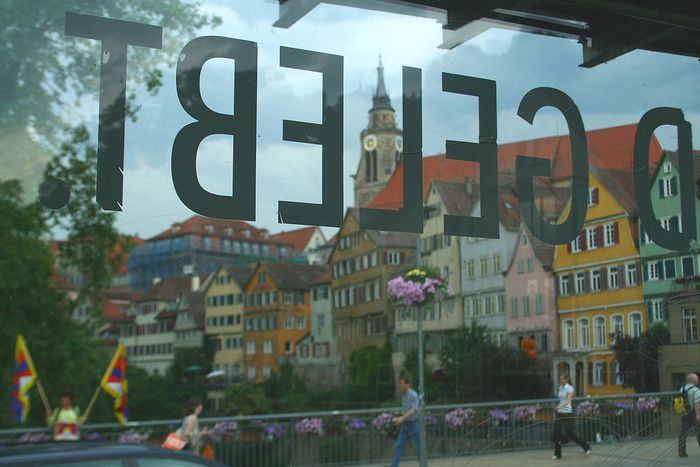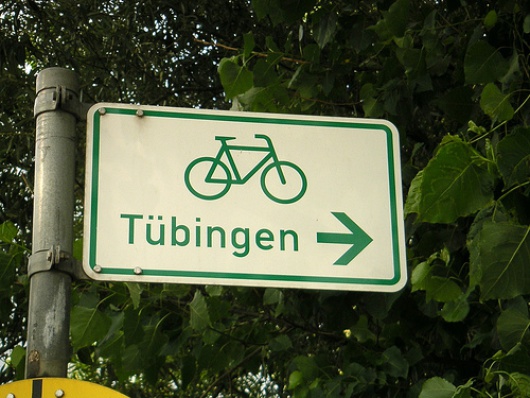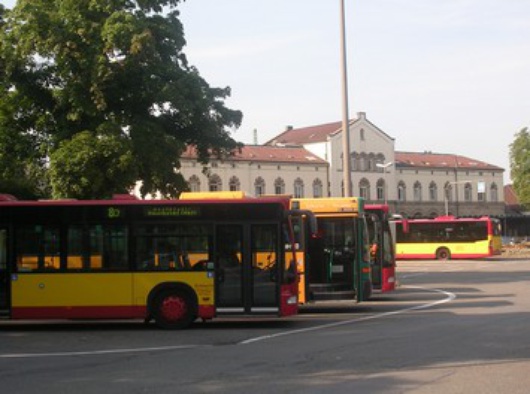
Tübingen, buses and Europe
Published on
Translation by:
 Sarah Meleleu
Sarah Meleleu
Europaplatz (‘Europe Square’) is not just a bus station in Tübingen. It is actively integrated in the urban reality of this ancient charming town which lies on the river Neckar
Situated between the station and the centre, Europaplatz in the small university town of Tübingen in Baden Württemberg could have become a well worn path thanks to its geographical location. Unfortunately, this square does not do credit to the rest of the town.
Fine line between the symbolic and pragmatism
 Tübingen enjoys a reputation as an open and cosmopolitan town. What better name than ‘Europe Square’ to welcome the travellers when leaving the station? It was christened thus in 1965, following the town being awarded the Europe Prize by the European parliament for their efforts carried out in terms of twinning. It should have become the symbol of a Europe of communication. It was up to the authorities to choose a new name.
Tübingen enjoys a reputation as an open and cosmopolitan town. What better name than ‘Europe Square’ to welcome the travellers when leaving the station? It was christened thus in 1965, following the town being awarded the Europe Prize by the European parliament for their efforts carried out in terms of twinning. It should have become the symbol of a Europe of communication. It was up to the authorities to choose a new name.
So why the bus station? Officially, the location should mark a place of communication, which seemed to correspond well to the European idea. A further argument was that Tübingen, a French garrison town since the end of the second world war, set up a bus route to Strasbourg from 1948. This ‘European bus’ was also the only destination abroad: an argument that definitely says a lot about the emphasis on European goals. And this was a place that consisted of neither houses nor business, where no changes of address would really be necessary, thus the renaming.
With the giving of this prize, a ‘Europe day’ should have been established and a commemorative plaque installed: two good resolutions that have never seen the light of day. The integration of the European idea into the urban environment, let alone into the conscience of the inhabitants of the town, was therefore reduced from the start to announcing ideas. The logical consequence: their identification with Europe has reduced considerably.
Almost non-existent identification with Europe
‘What links you personally to Europe Square?’ Most passersby respond that they are well and truly ‘European’. But it goes no further than that. None of the shopkeepers questioned, for example, has ever offered a product or service linked to a European event. Moreover, this place represents little more than a ‘concrete desert’ to the residents of Tübingen. Unanimously, they say that an ‘attractive side needs to be restored to this place’, which could be done by reducing the expanse of bus traffic and creating a real living space. For fifteen years, the question of redevelopment has been cropping up frequently in town debates. The new mayor Boris Palmer (Greens) hoped that a restructuration will take place in three or four years time. He wants to make it more ‘worthy’ of its name, without necessarily having a concrete idea concerning the new European boost to the square.
European bus in the garage
 ‘A change may take place, but most probably when I am already dead.’ If you believe the pessimism of a shopkeeper in the area, things do not seem ready to move. Besides, the only worry of the traders and residents is limited to the ‘development of commerce in the area in order to boost the bid’. As a result, even if this square should be transformed, it seems that the European issue remains largely neglected here.
‘A change may take place, but most probably when I am already dead.’ If you believe the pessimism of a shopkeeper in the area, things do not seem ready to move. Besides, the only worry of the traders and residents is limited to the ‘development of commerce in the area in order to boost the bid’. As a result, even if this square should be transformed, it seems that the European issue remains largely neglected here.
Today the urban symbol, like the last links that connected the town of Tübingen to Europe, has completely disappeared. The bus stop ‘Europe Square’ was changed in 1996 to a simple ‘bus station’. And the coup de grace struck in September 2008: the famous ‘European Bus’, a route originally exclusively reserved for the soldiers and their families, commercialised in the mid fifties, was put in the garage. Numerous voices were raised against this decision. But profitability compels it: ‘The route has become too unprofitable.’
Translated from Tübingen, trouver sa place dans l'Europe


